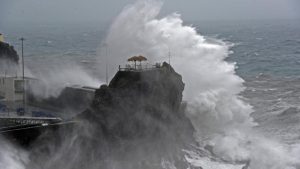Heat waves similar to the one affecting western Europe, which hit Portugal last week, will be increasingly frequent and intense until at at least 2060, opined the World Meteorological Organisation (WMO) today.
At a press conference, WMO Secretary General, Petteri Taalas, said that these types of heat waves “will become the norm and much hotter. The higher frequency of these negative trends will continue at least until 2060, regardless of whether or not we succeed in mitigating climate change.”
The current heat wave in western Europe was reflected in several countries, namely in the United Kingdom, where the maximum temperature today exceeded 40ºC. Temperatures broke several records in France, and the extreme heat in both Spain and Italy have created the perfect forest fire conditions.
In Portugal, which last week experienced its second heat wave of the year, thermometers registered 46.3ºC on Wednesday in Lousã, the hottest place in the country that day, and the hottest day of 2022. The soaring temperatures not only exacerbated the forest fire situations, at least 50 weather stations recorded maximum temperatures of between 40ºC and 45ºC.
Speaking to Lusa, researcher Pedro Matos Soares, a specialist in atmospheric physics, said, based on future weather pattern modelling, Portugal could experience, in the most serious scenario, eight to ten heat waves per year from 2070 onwards.
According to the Portuguese Institute of Atmosphere and Sea (IPMA), the first 17 days of July were the hottest of this century, with temperatures of 25.7ºC. The highest temperatures of 47°C occurred at the Pinhão meteorological station, and is a new July extreme heat record in mainland Portugal.
It is believed that 1,063 people have died due to extreme weather conditions, between the 7th and 18th of July.
Samantha Gannon
info at madeira-weekly.com








